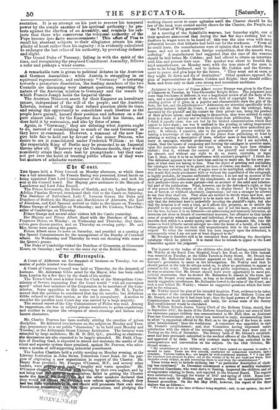A remarkable turn is given to political debates in the
Austrian mid German Assemblies : while Austria is struggling in an equivocal regeneration, and embryonic " Germany " is tottering towards a premature dissolution, the leading members of the two Councils are discussing very abstract questions, respecting the nature of the Austrian relation to Germany and the tenure by which Francis Joseph holds the Imperial throne. The Austrian Ministers assert for their Emperor an hereditary tenure, independent of the will of the people; and the Austrian Xiberels, instead of letting that refined question abide its time, and seizing this opportunity to consolidate such liberties as the people have gained, hazard their position and influence on a dis- pute almost ideal ; for the Emperor does hold his throne, and does held it by succession, and also by force of arms.
Again, in "Germany," they are debating what Austria ought to do, instead of coneolidating so much of the said Germany as they have at command. However, a remnant of the new Em- pire bids fair to hold out by favour of the minor Princes, who done to see it consolidated under Frederick William : so that the respectable King of Berlin may be promoted to an Imperial throne after all. Whatever way the Germans decide, they would Penifest/y attain their ends beat by promptitude : but they can- not get over the habit of treating public affairs as if they were intt Vatter* of scholastic exercise.


























 Previous page
Previous page